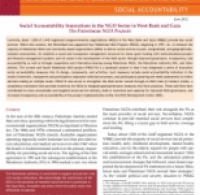
At the turn of the 20th century, Palestinian charities started their activities, operating within the legal framework for nonovernmental organizations (NGOs) as stipulated in Ottoman law. The 1960s and 1970s witnessed a substantial proliferation of Palestinian NGOs (mostly charitable organizations operating regionally under Jordanian law) that provided social, educational, and medical services even after 1967 when the Israeli civil administration took over the primary responsibility for providing social services. The signing of the Oslo agreement in 1993 and the subsequent establishment of the Palestinian Authority (PA) in 1994 marked a new era where Palestinian NGOs redefined their role alongside the PA as the main provider of social services. Nevertheless, NGOs continue to provide essential social services that complement the PA, filling a crucial gap in both service coverage and funding.
